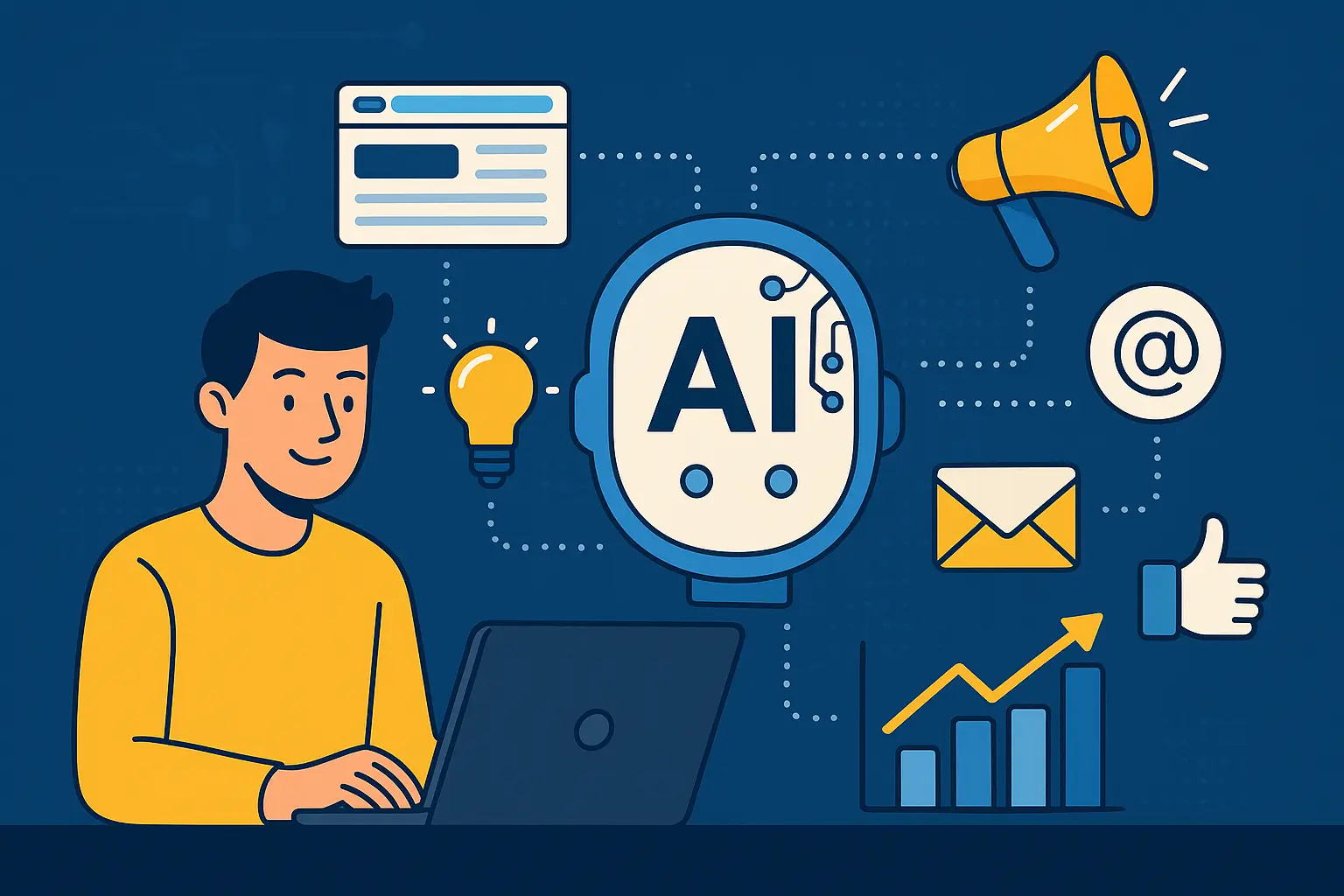Digital marketing is evolving at lightning speed, and Artificial Intelligence (AI) is at the core of this transformation. From customer segmentation to content creation and predictive analytics, AI is helping marketers deliver more personalized, efficient, and data-driven campaigns than ever before. In this article, we’ll explore how AI is reshaping the digital marketing landscape and what it means for businesses and consumers alike.
AI in Customer Segmentation and Targeting
Understanding your audience is the cornerstone of effective marketing. AI enhances this process by:
- Analyzing consumer behavior across platforms
- Identifying high-value customer segments
- Creating dynamic customer personas
- Delivering hyper-targeted messages in real time
Instead of relying on assumptions, marketers can use AI to uncover actionable insights and make data-informed decisions.
Predictive Analytics and Behavior Forecasting
AI models use historical data to predict future customer actions, such as:
- Purchase likelihood
- Churn risk
- Engagement trends
- Lifetime value
This allows brands to anticipate needs and tailor campaigns that resonate at just the right moment.
Personalized Content and Recommendations
AI powers content personalization by:
- Recommending products based on browsing and purchase history
- Delivering dynamic email content tailored to each recipient
- Personalizing website experiences in real time
- Suggesting relevant blog posts or resources
Netflix, Amazon, and Spotify are prime examples of companies using AI to drive engagement through personalization.
Chatbots and Conversational Marketing
AI-powered chatbots are transforming customer interactions. They:
- Provide 24/7 assistance on websites and apps
- Qualify leads by asking intelligent questions
- Guide customers through purchasing decisions
- Book appointments or resolve complaints
With natural language processing (NLP), modern chatbots offer human-like interactions that boost customer satisfaction and conversion rates.
Automated Content Creation
AI tools can now generate marketing content such as:
- Blog post drafts
- Social media captions
- Ad copy variations
- Email subject lines
Tools like Jasper, Copy.ai, and ChatGPT help marketers scale content production while maintaining quality and consistency.
AI in Search Engine Optimization (SEO)
AI supports SEO by:
- Analyzing keyword trends and content gaps
- Suggesting topic clusters and content structure
- Optimizing meta descriptions and headers
- Tracking algorithm changes and ranking fluctuations
SEO platforms like Clearscope, Surfer SEO, and MarketMuse use AI to guide content creation that aligns with search engine algorithms.
Dynamic Pricing and Offer Optimization
AI helps companies adjust pricing strategies in real time by:
- Monitoring competitor prices and market demand
- Personalizing discounts based on user behavior
- Optimizing offers for profitability and conversion
This is particularly effective in e-commerce, hospitality, and travel sectors.
Programmatic Advertising
AI automates ad buying through programmatic platforms that:
- Target users with precision across devices and channels
- Optimize bidding strategies in real time
- Reduce ad spend waste by avoiding low-performing placements
Google Ads, Meta Ads, and The Trade Desk incorporate AI to improve ROI on digital ad campaigns.
Visual Recognition and Creative Testing
AI analyzes image and video performance to:
- Determine which creatives drive the most engagement
- Test multiple ad versions automatically
- Generate alternative visuals using generative AI
This allows brands to optimize visual storytelling and improve campaign outcomes.
Voice Search and Smart Assistants
As voice search grows, marketers must optimize content for platforms like:
- Amazon Alexa
- Google Assistant
- Apple Siri
AI helps interpret natural language queries and ensure that brands are discoverable through voice-enabled devices.
Sentiment Analysis and Brand Monitoring
AI tools scan online mentions, reviews, and social media for:
- Customer sentiment toward products or campaigns
- Brand reputation trends
- Emerging issues or PR crises
These insights help brands respond proactively and maintain a positive public image.
Benefits of AI in Digital Marketing
1. Efficiency and Scalability
AI automates repetitive tasks, allowing marketers to focus on strategy and creativity.
2. Enhanced Personalization
AI delivers experiences tailored to individual preferences, improving engagement and loyalty.
3. Data-Driven Decisions
AI provides real-time insights that guide campaign planning and optimization.
4. Cost Reduction
With smarter targeting and automation, brands achieve more with fewer resources.
5. Competitive Advantage
Early adopters of AI gain a significant edge in speed, relevance, and ROI.
Challenges and Ethical Considerations
Despite its power, AI in marketing raises important concerns:
1. Privacy and Data Usage
Marketers must comply with data protection regulations like GDPR and CCPA, and prioritize transparent data practices.
2. Content Authenticity
Over-reliance on AI-generated content can lead to bland or inauthentic messaging if not carefully reviewed.
3. Algorithmic Bias
Biased AI models can exclude certain groups or deliver unfair results, impacting inclusivity.
4. Over-Automation
Too much automation can reduce human touch and emotional resonance in marketing.
5. Technical Complexity
AI tools require setup, training, and integration, which can be challenging for smaller businesses.
Future Trends in AI-Powered Marketing
Looking ahead, we can expect:
- Emotion AI that adapts messaging based on user mood
- AI-generated video content for personalized ads and tutorials
- Augmented reality (AR) product demos powered by AI
- Voice-first content strategies
- AI-driven influencer marketing platforms
These innovations will further blur the line between technology and human connection in marketing.
Final Thoughts: The AI Marketing Revolution
Artificial Intelligence is not just another tool in the digital marketer’s toolkit—it’s a foundational technology that’s reshaping the entire field. By enabling personalization, automation, and real-time insights, AI empowers brands to connect with audiences more effectively than ever before.
As AI continues to evolve, marketers must strike a balance between automation and authenticity—leveraging the power of machines while staying true to the human spirit of creativity and empathy.
